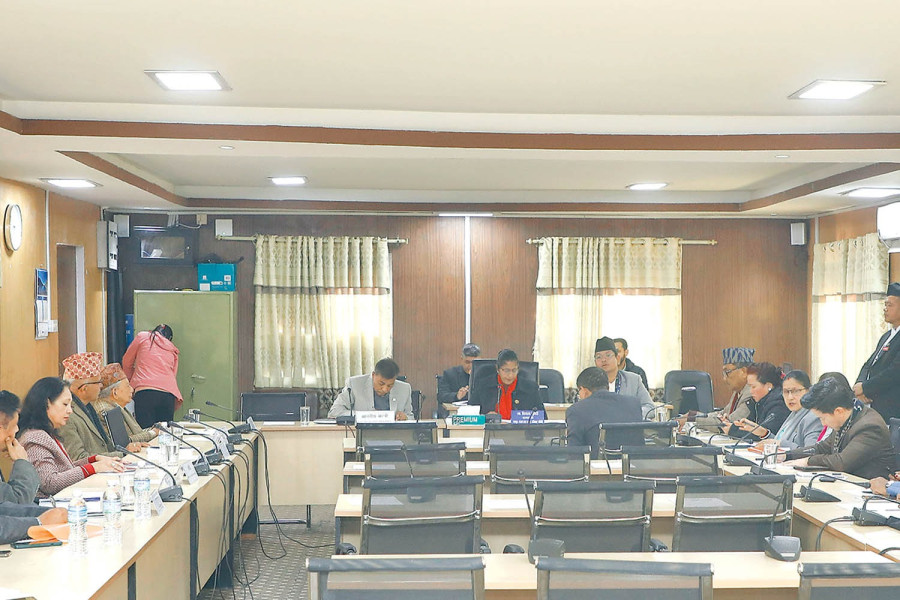National
Lawmakers voice concern about deferrals in hearing petition against 2020-21 appointments in constitutional bodies
National Human Rights Commission officials urge lawmakers to pressure the government into introducing the bill to amend NHRC Act in Parliament.
Post Report
Amid frequent deferrals in hearing the petitions challenging the appointments in various constitutional bodies, lawmakers have drawn the judiciary’s attention to the matter.
Expressing their views during an interaction with the National Human Rights Commission’s office bearers on Friday, lawmakers on both sides of the political aisle said not concluding the hearing even in four years was concerning.
The agency concerned must be responsible for the delay, said CPN-UML Chief Whip Mahesh Bartaula at a meeting of the House of Representatives’ Law, Justice and Human Rights Committee.
The Constitutional Council recommended 52 individuals for appointment to various constitutional bodies on December 15, 2020, and May 9, 2021, when UML chair KP Sharma Oli was the prime minister. Then-President Bidya Devi Bhandari appointed the chair and four commissioners based on the recommendations without parliamentary hearing. The House of Representatives was at that time dissolved by the Oli-led government, only to be reinstated by the Supreme Court later.
The council had recommended them after a controversial amendment to the Constitutional Council (Functions, Duties, and Procedures) Act through an ordinance on December 15, 2020.
The recommendations were made by three—the prime minister, the National Assembly chairperson and the chief justice—of the six council members. Although there is a constitutional provision for mandatory parliamentary hearings, Bhandari appointed the commissioners based on the House regulation that a nominee is considered eligible for the nominated position if the hearing committee fails to decide within 45 days.
Fifteen writ petitions have been filed challenging the amendment to the Act through an ordinance by the Oli government and the appointments made by the President. However, four years since, the Constitutional Bench of the Supreme Court has not concluded the hearing of the petitions.
The petitions have been put on the cause list 32 times but never heard. “Justice delayed is justice denied. What is the point of deciding the petitions after the office bearers complete their tenure,” asked Nepali Congress lawmaker Sushila Thing.
The chief commissioner and commissioners of the constitutional commissions have six years of tenure. Most of them have already completed four years. The petitions were on Wednesday’s cause list as well but it passed without a hearing.
“Our appointment landed in controversy on the very first day,” said Mihir Thakur, a member of the constitutional human rights watchdog. “How long is the court going to put the petitions on hold? It should set priorities for them.”
At the interaction, NHRC officials also urged the lawmakers to pressure the government into introducing the bill to amend the NHRC Act in Parliament. With the government's consent, the commission five months ago drafted the bill and forwarded it to the Prime Minister's Office. However, the government has yet to table it in Parliament for passage.
"The lawmakers asked to share the draft bill. We will share it with them and have discussions on it even if the government doesn't introduce it," said Murari Kharel, secretary at the commission.
Having a new law is necessary to transform the commission into a federal structure and also to ensure its autonomy.
On several occasions, the Global Alliance of National Human Rights Institutions (GANHRI) has said the existing Act needs to be revised to ensure the commission’s autonomy, not just in investigations but also in budget management as per the Paris Principles.
Adopted in 1993 by the United Nations General Assembly, the Paris Principles set six criteria that national human rights institutions need to meet. These include autonomy from the government, independence as guaranteed by the constitution, adequate competence, pluralism, and the availability of resources and powers to carry out investigation.
Currently the government controls its finances, forcing the commission to seek the finance ministry’s approval in budgetary headings.




 10.12°C Kathmandu
10.12°C Kathmandu














